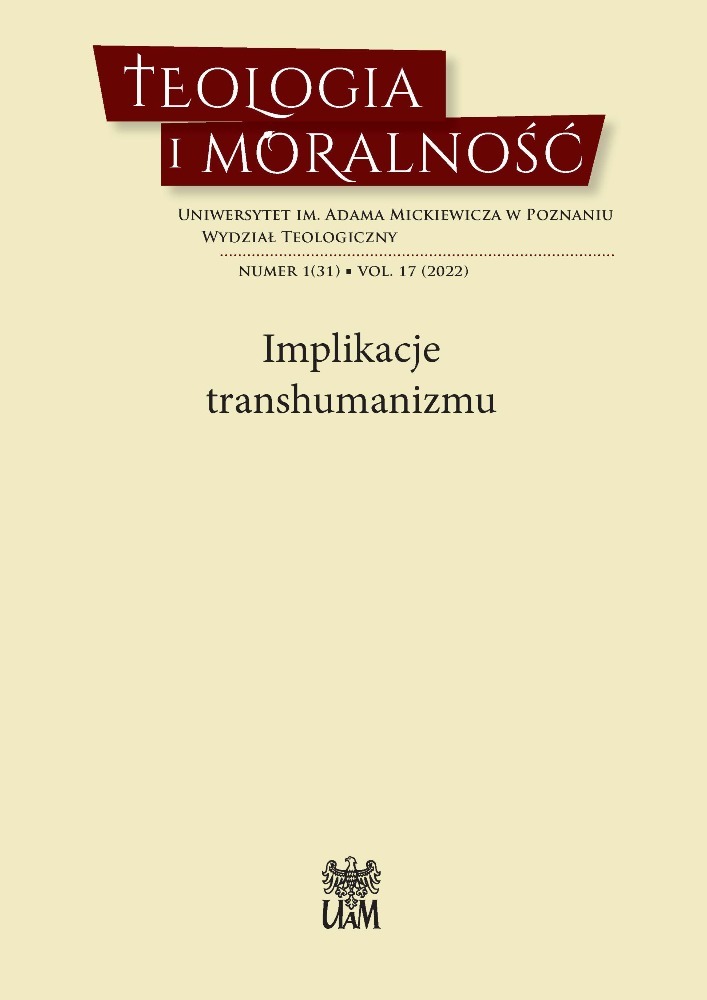Abstract
The object of consideration is transhumanist values, formulated by Nick Bostrom, the realization of which is supposed to justify the dynamic process of technicization of the human living environment and its biological constitution. The return to Bostrom’s non-new proposal and its subsequent critical analysis allow us to learn more deeply about the goals of the ideology of transhumanism, which is beginning to replace the traditional humanities. The result of the analysis indicates the necessity of returning to the traditional system of ethical values and preserving in the evolving transhuman the human person. The article also takes a closer look at the state and possibilities of the new integrated GRIN technologies, whose introduction, largely guided by the laws of commerce, threatens the loss of man’s control over his own creation.
References
Arystoteles. 2007. Etyka nikomachejska, tłum. Daniela Gromska. Warszawa: Wydawnictwo Naukowe PWN.
Bostrom, Nick. 2005. Transhumanist values. Review of Contemporary Philosophy, 4(1-2), 87-101.
Brodie, Richard. 1997. Wirus umysłu, tłum. Piotr Turski. Łódź: TeTa Publishing.
Cecchetto, David. 2013. Humanesis. Sound and technological posthumanism. Minneapolis–London: University of Minnesota Press.
Convergence. Fascilitating Transdisciplinary Integration of Life Sciences, Physical Sciences, Engineering and Beyond. 2014. National Research Council of the National Academies. Washington DC: The National Academies Press.
Dostojewski, Fiodor. 1978. Bracia Karamazow, tłum. Aleksander Wat. Warszawa: PIW.
Doudna, Jennifer i Samuel H. Sternberg. 2017. A Crack in Creation: Gene Editing and the Unthinkable Power to Control Evolution. New York: Houghton Mifflin Harcourt Publ. Comp.
Grabińska, Teresa. 2003. Etyczny kontekst analizy pojęcia „przedsiębiorczość”. Archeus. Studia z Bioetyki i Antropologii Filozoficznej, 4, 141-177.
Grabińska, Teresa. 2014. Nanotechnologie a bezpieczeństwo personalne i strukturalne. Logistyka, 2, Logistyka - nauka. płyta CD, nr 1, 556-563.
Grabińska, Teresa. 2018. Bezpieczeństwo osoby i wspólnoty. Ochrona bytu osobowego w obliczu ideologii i praktyki transhumanizmu. Wrocław: Wydawnictwo AWL.
Grabińska, Teresa. 2022a. Dylematy transhumanizmu I: ewolucja biologiczno-technokulturowa a ulepszanie człowieka, Teologia i Moralność, 17, 31-44.
Grabińska, Teresa. 2022b. Transhumanistyczna denaturalizacja w świetle ekologii integralnej. Wrocławski Przegląd Teologiczny, 1, w druku.
Grabińska, Teresa. 2022c. Wartości transhumanistyczne a norma personalistyczna. W: Ulepszanie człowieka, red. Piotr Duchliński i Grzegorz Hołub. Kraków: Wydawnictwo Naukowe Akademii Ignatianum, w druku.
Kopania, Jerzy. 2021. Transhumanizm jako magia racjonalna. W: Bezpieczeństwo personalne a bezpieczeństwo strukturalne, t. 11: Instrumentarium wojny kulturowej, red. Teresa Grabińska i Piotr Szczepański, 139-167. Wrocław: Wydawnictwo AWL.
Kurzweil, Ray. 2013. Progress and Relinquishment. W: The Transhumanist Reader, red. Max More i Natasha Vita-More. Chichester: Wiley-Bleckwell.
Mały słownik terminów i pojęć filozoficznych dla studiujących filozofię chrześcijańską. 1983. opr. Antoni Podsiad i Zbigniew Więckowski. Warszawa: Instytut Wydawniczy Pax.
More, Max. 1990. Transhumanism: Towards a Futurist Philosophy. Extropy, 6, 6-12.
Nowacka, Maria. 2016. Bezpieczeństwo zdrowotne: od perswazji do przymusu. W: Bezpieczeństwo personalne a bezpieczeństwo strukturalne, t. 4: Bezpieczeństwo w antroposferze i infosferze, red. Teresa Grabińska i Zbigniew Kuźniar, 109-121. Wrocław: Wydawnictwo WSOWL.
Popper, Karl. 1963. Conjectures and Refutations: The Growth of Scientific Knowledge. London: Routledge and Kegan Paul.
Szymanowski, Paweł. 2019. Faith, technology and the future: The critical analysis of Christian transhumanism. Roma: Pontificia Università Lateranense, Accademia Alfonsiana, Istituto Superiore Di Teologia Morale.
License
Copyright (c) 2022 Teresa Grabińska

This work is licensed under a Creative Commons Attribution-NoDerivatives 4.0 International License.

